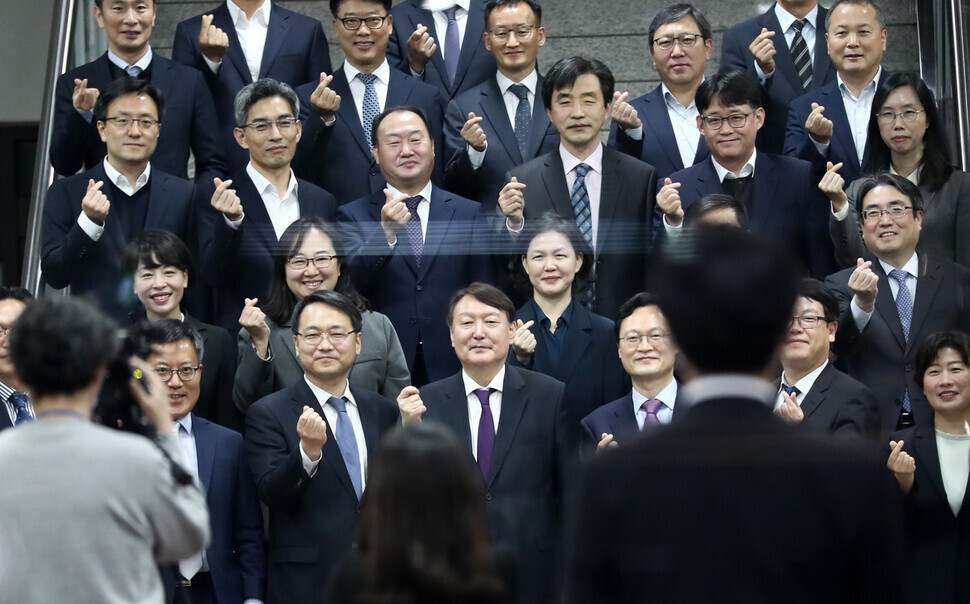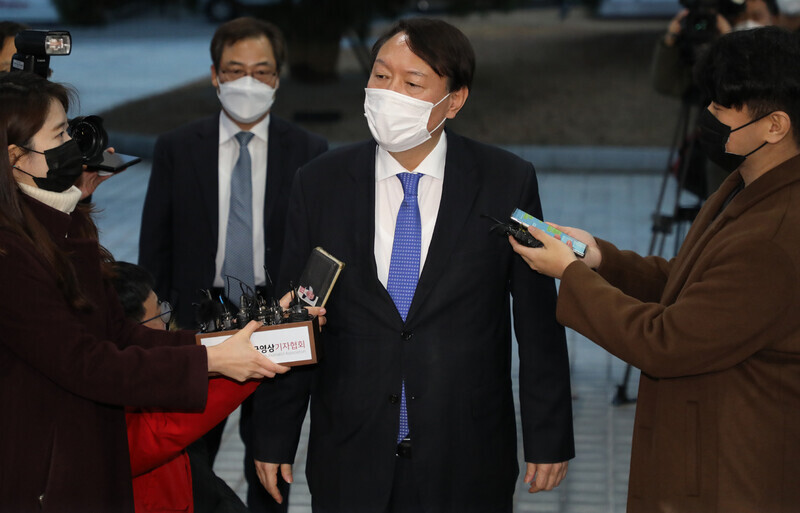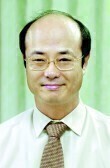hankyoreh
Links to other country sites 다른 나라 사이트 링크
[Column] Will the prosecutors emerge victorious again?

Justice Minister Choo Mi-ae and Prosecutor General Yoon Seok-youl — both of the feuding South Korean officials have distinctive personalities. But focusing on their individuality can distract us from the fundamental issue at stake. At its essence, this is a clash between political forces that want to bring the public prosecutors under control and a prosecution service that is loath to give up its authority to carry out investigations directly.
The justice minister is a member of the cabinet who advises the president on the affairs of state and deliberates those affairs in cabinet meetings. The minister is also in charge of prosecution, criminal administration, the defense of human rights, and immigration management, along with other legal affairs.
The prosecutor general is head of the prosecutors, a specific type of public servant. As the executive of the Supreme Prosecutors’ Office (SPO), the prosecutor general handles the affairs of the prosecution service and directs and supervises public servants at the SPO.
The SPO is a government agency that reports to the justice minister, who has three methods of controlling prosecutors.
First is the justice minister’s authority to direct and supervise the prosecutors. This refers to the minister’s general status as primary supervisor of the prosecutors’ work; in regard to specific cases, the minister only directs and supervises the prosecutor general.
Second is the justice minister’s authority over personnel decisions. Appointments in the prosecution service are made by the president on the minister’s recommendation.
Third is the justice minister’s authority over disciplinary action. The minister is the chair of the prosecutorial disciplinary board, which is operated by the Ministry of Justice (MOJ).
On the surface, the justice minister would appear to be much more powerful than the prosecutor general. But in reality, that’s not the case. Even though Choo has played all three of the cards in her hand, she’s on the defensive against Yoon.
There are two reasons for that. The first is that Choo overplayed her hand. By playing hardball, she weakened her own cause. Following the letter of the law isn’t enough — she also needed procedural legitimacy and public support.
Second, Choo appears to have underestimated her opponent. This is an even bigger mistake. Yoon is a “company man.” “I’m not loyal to people,” he once said. “A prosecutor must obey the wishes of the organization, regardless of right or wrong.”

Yoon is totally committed to the prosecution service. Ideologically speaking, he’s neither a conservative nor a progressive — he’s a prosecutor. That can be even more dangerous than far right or far left.
As prosecutors go, there’s nothing eccentric about Yoon. There are dozens, if not hundreds, of other people like Yoon in the prosecution service. That seems to have slipped Choo’s mind.
When rank-and-file prosecutors unanimously signed a statement condemning Choo’s disciplinary action against Yoon, most of them probably thought her measures were illegal and affair. The statement even included a courteous request: “We earnestly implore that you make a level-headed reappraisal [of your decision] and to take corrective measures to ensure that the goal of prosecutorial reform is not distorted and its sincerity is not damaged.”
But it’s unclear how many prosecutors support the Moon administration’s actual plan for prosecutorial reform; namely, reducing the prosecutors’ ability to carry out direct investigations and checking the prosecution service by launching an independent office for investigating corrupt high-ranking officials.
That’s not because the prosecutors are evil. If anything, the problem may be excessive feelings of justice and responsibility. Resisting the loss of authority is a collective instinct of elite institutions.
If prosecutorial reform doesn’t happen under Moon, it may never happen at allThe next question is who will be the victor in Choo and Yoon’s feud. But we shouldn’t forget the more important thing: the government’s agenda of prosecutorial reform.
Is there any way for the Moon administration to preserve momentum for prosecutorial reform following this debacle? If even the Moon administration fails to reform the prosecution service, that reform will be permanently out of reach.
In the 2011 book “Moon Jae-in and Kim In-hoe’s Thoughts on the Prosecution Service,” Moon wrote, “Perhaps we have been too naive about political neutrality. I’d assumed that, if we could just resolve the issue of political neutrality, what might be called the democratization of the prosecutors would come to fill that framework.” Moon was expressing his regret for trusting the prosecutors during the presidency of Roh Moo-hyun.
But then, after becoming president, Moon instructed those same prosecutors to fully prosecute corruption in previous administrations and appointed an institutionalist as prosecutor general. Such behavior is baffling.
It’s not too late. People are important, but in the end, reform requires the repair of institutions.
What needs to be done? The office for investigating corruption among high-ranking officials should be launched. That would represent the beginning of prosecutorial reform.
Authority to conduct investigations needs to go to another institutionEventually, the prosecutors’ authority to carry out investigations needs to be handed over to another organization. As long as the prosecutors hold both the power to investigate and to indict, they’ll never allow reforms to go through.
South Korea’s opposition party also needs to get its head on straight. What does the People Power Party think will happen if their candidate wins the presidential election in 2022, without carrying out prosecutorial reform?
In the first half of a conservative administration, the prosecutors will focus their investigation on corruption by the Moon administration. And in the second half, they’ll turn their guns on the conservatives.
It’s a never-ending story in which neither the ruling nor the opposition parties, but only the prosecutors, are the eternal victors. It’s not the Moon administration that the opposition party should be afraid of, but the prosecutors.

By Seong Han-yong, senior political writer
Please direct comments or questions to [english@hani.co.kr]

Editorial・opinion
![[Column] Season 2 of special prosecutor probe may be coming to Korea soon [Column] Season 2 of special prosecutor probe may be coming to Korea soon](https://flexible.img.hani.co.kr/flexible/normal/500/300/imgdb/original/2024/0426/3317141030699447.jpg) [Column] Season 2 of special prosecutor probe may be coming to Korea soon
[Column] Season 2 of special prosecutor probe may be coming to Korea soon![[Column] Park Geun-hye déjà vu in Yoon Suk-yeol [Column] Park Geun-hye déjà vu in Yoon Suk-yeol](https://flexible.img.hani.co.kr/flexible/normal/500/300/imgdb/original/2024/0424/651713945113788.jpg) [Column] Park Geun-hye déjà vu in Yoon Suk-yeol
[Column] Park Geun-hye déjà vu in Yoon Suk-yeol- [Editorial] New weight of N. Korea’s nuclear threats makes dialogue all the more urgent
- [Guest essay] The real reason Korea’s new right wants to dub Rhee a founding father
- [Column] ‘Choson’: Is it time we start referring to N. Korea in its own terms?
- [Editorial] Japan’s rewriting of history with Korea has gone too far
- [Column] The president’s questionable capacity for dialogue
- [Column] Are chaebol firms just pizza pies for families to divvy up as they please?
- [Column] Has Korea, too, crossed the Rubicon on China?
- [Correspondent’s column] In Japan’s alliance with US, echoes of its past alliances with UK
Most viewed articles
- 1‘We must say no’: Seoul defense chief on Korean, USFK involvement in hypothetical Taiwan crisis
- 2After election rout, Yoon’s left with 3 choices for dealing with the opposition
- 3Why Kim Jong-un is scrapping the term ‘Day of the Sun’ and toning down fanfare for predecessors
- 4AI is catching up with humans at a ‘shocking’ rate
- 5Two factors that’ll decide if Korea’s economy keeps on its upward trend
- 6[Column] Park Geun-hye déjà vu in Yoon Suk-yeol
- 7Division commander ordered troops to enter raging flood waters before Marine died, survivor says
- 8Gangnam murderer says he killed “because women have always ignored me”
- 9South Korea officially an aged society just 17 years after becoming aging society
- 10No good, very bad game for Korea puts it out of Olympics for first time since 1988